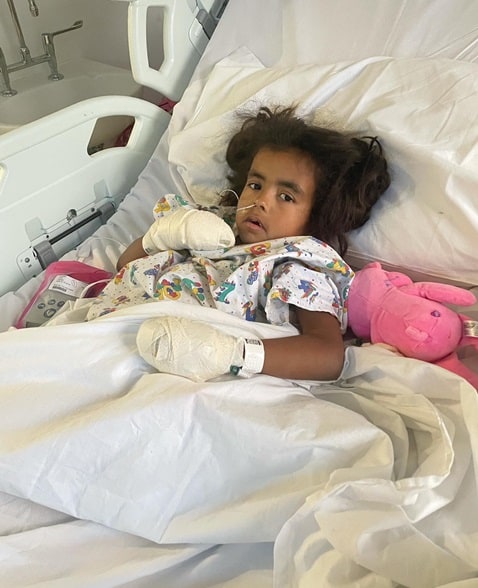
The family of a “funny” and “happy” eight-year-old from Ramsgate are working to raise awareness of the rare genetic condition that she lives with and the need for more bone marrow donors from minority ethnic backgrounds.
Mum Tamsin Howe says daughter Arabella finally got a diagnosis of APDS, also known as Activated phosphoinositide 3-kinase delta syndrome, after seven years of doctor and hospital visits due to constant infections.
Symptoms of APDS, which can lead to lymphoma, include frequent and severe infections of the ears, sinuses, and upper and lower respiratory tracts. It is a very rare genetic condition with about 30–40 people in the UK known to be affected.
People with APDS are unable to fight infections because their immune system does not work properly. The white blood cells are abnormal and incapable of handling infections properly, meaning they can’t recognise and attack bacteria and viruses to prevent infection.
A bone marrow transplant would replace the faulty or missing immune cells that lead to APDS and the healthy marrow can potentially cure the disease but Arabella faces another hurdle with this as her Caribbean/Indian/British ethnicity makes finding a match donor almost impossible.

Tamsin, who is also mum to four-year-old Lilly, said: “Arabella is quite poorly. Great Ormond Street Hospital has been searching for a donor for bone marrow in order to cure her condition but due to her ethnicity we are at a dead end. We have been told something like one in 700m. A 9/10 match was found but that means a high risk of mortality so I said no as I do not want to risk anything where we could potentially lose her.”
Currently the Newington primary pupil undergoes Immunoglobulin replacement therapy which puts antibodies into her system to help fight infection. This is done by Tamsin at home every two weeks.
The youngster also has trial drug Leniolisib after being accepted on compassionate grounds due to her being unable to find a donor for bone marrow.
Pharming Group, which produces the drug, plans to apply to the Medicines and Healthcare products Regulatory Agency this year for permission to market Leniolisib in the UK.

Tamsin, 27, said: “Arabella missed the whole of her Reception year at school other than three or four weeks because she is so prone to infection and picks up everything. She also missed most of Year 1. In Year 2 she had the replacement therapy with the IV’s at home so has been doing a bit better since then.
“It does affect her education and being able to mix with other children. She had covid last September and I thought she was doing well as she was just a bit sniffly but then she woke up one morning with a pain in her stomach and her lung had collapsed again.
“She copes with it all so well even though she has quite a few problems. She loves everything and is into everything. She is really funny with her little sense of humour and really positive about everything and always happy.
“She really wants to try horse-riding and although over the last few years we have been advised not to do strenuous activities this is something we’d really like for her.”

The road to diagnosis was lengthy with medical staff originally blaming tonsillitis as they did not know what was causing her frequent illnesses and had not done genetic testing.
She was sent to Great Ormond Street in 2021 where antibody tests were carried out and went to the Royal Brompton for genetic testing. Arabella was finally diagnosed in 2022 and shortly after had to undergo surgery to remove her lymph node after being hit by a nasty infection.
The youngster remains under the care of Great Ormond Street and The Royal Brompton and must return to hospital every two to three months.
Tamsin and husband Daniel plan to set up a petition to Parliament to get APDS added to the heel prick test which screens newborns for various conditions.
Tamsin is also fundraising for the Immunodeficiency UK charity which supports people and families living with primary or secondary immunodeficiency conditions and she wants to raise more awareness around bone marrow donation.

She said: “Immunodeficiency UK fund research and support people. We want to offer support and help to any family’s going through hard times in trying to help their children. APDS causes lymphoma if left untreated and many children who have reoccurring lymphoma and immunodeficiency symptoms could have the disease and are completely unaware. we would love to raise some money for this amazing charity, so we can help other families and children who are also suffering.
“Getting the heel prick test petition to Parliament is also a main aim because if it is successful it could help a lot.
“Over everything we want to get the message out about bone marrow and encourage more people to be a donor.
“We want to help other families who are struggling as we had to fight for seven years to get where we are today. We want other parents to know that they are not alone, we know our children and we know when something is wrong.”
Find the fundraising page by clicking here
Bone marrow donation
Find out more about the British Bone Marrow Registry at: https://www.bbmr.co.uk/joining-the-register/
About APDS
Activated PI3K delta syndrome (APDS) is a PID where white blood cells in the immune system don’t work correctly, particularly ones that are called B cells and T cells. Normally, these cells recognise and attack viruses and bacteria to prevent infection.
In APDS, the white blood cells are abnormal so these patients often have frequent infections in the lungs, nose (sinuses) and ears, and can be at greater risk of developing conditions linked with the overproduction of white blood cells (such as swollen lymph nodes and lymphoma).
APDS usually starts in childhood and is first seen as frequent i infections, particularly of the lungs, nose and ears. Over time, repeated lung infections can lead to a condition called bronchiectasis, in which the airways of the lungs become damaged and wider than normal, which leads to a build-up of mucus that can cause breathing problems and make the lungs even more prone to infection.
The genes that lead to APDS are inherited.
Find out more at Immunodeficiency UK at: https://www.immunodeficiencyuk.org/

